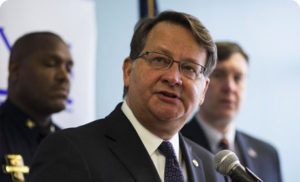It’s Happening in Michigan – How Can We Alleviate Poverty in Michigan and Beyond?
Tuesday, February 20, 2018
Featured speaker:
H. Luke Shaefer , UM School of Social Work
MI Senate Binsfeld Office Building, Room 5550, 5th Floor
201 Townsend St., Lansing, MI 48933
11:30 a.m. – 12:30 p.m.
View PDF
Some Michigan residents are living on cash incomes of $2 or less per day, while others are carrying high levels of debt, struggling to pay for their housing and other necessities, and reducing their chances for overall upward mobility. How do we better provide access to work opportunities and support systems that will aid families in need? What is working to prevent or alleviate poverty? What is not?
Poverty Solutions at the University of Michigan is examining these challenges from a variety of disci- plines and testing the most promising solutions through research interventions, partnering with policy- makers and the community. In the past four years, the good news is the percentage of Michigan residents living below the poverty line has dropped from 17.4 percent to 14.9, and child poverty has dropped four percentage points during this period. There are more Michiganders employed now than in 2012, and the median household income has risen. Yet, despite these promising trends, challenges persist as Michigan remains 33rd and in the bottom half of states battling poverty. We can do better. Please join us as UM Professor Luke Schaefer shares projects designed to deliver concrete results that will aid Michigan’s poor — expand their economic opportunities, and reduce their educational and health disparities.

H. Luke Shaefer is Director of Poverty Solutions at the University of Michigan. He is also an Associate Professor at the School of Social Work and the Gerald R. Ford School of Public Policy. Dr. Shaefer’s research on poverty and social welfare policy in the United States has been published in top peer-reviewed academic journals, including the Journal of Policy Analysis and Management and the Amer- ican Journal of Public Health, supported by the National Science Foundation.
Dr. Shaefer has presented his research at the White House and before numerous federal agencies, and he has testi ed before the U.S. Senate Finance Commit- tee. His work has been cited in the New York Times, the Washington Post, Na- tional Review, The Atlantic, Vox, the LA Times and Huf ngton Post. He has been featured on “Marketplace” and CNBC’s “Nightly Business Report.” His recent book with Kathryn Edin, “$2.00 a Day: Living on Almost Nothing in America,” has been named one of the 100 Notable Books of 2015 by the New York Times Book Review, and won the Hillman Prize for Book Journalism.
Author: Veronica A. W. Johnson, Ph.D
Director of the Lansing Service Center | [email protected] | 517-372-7801




